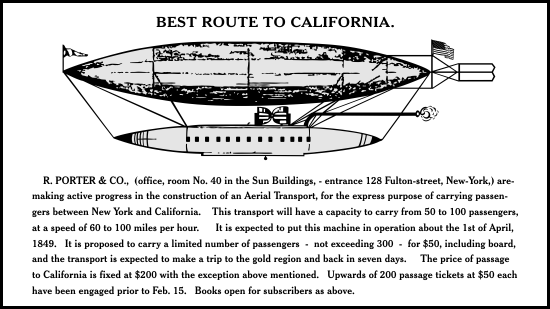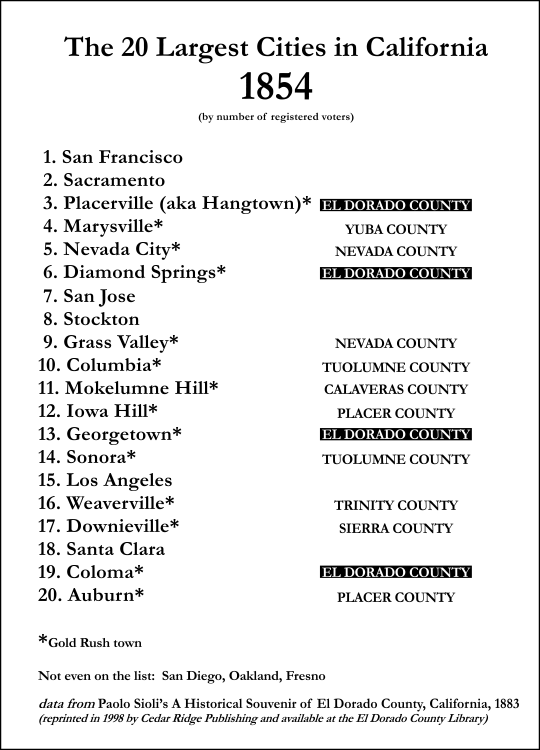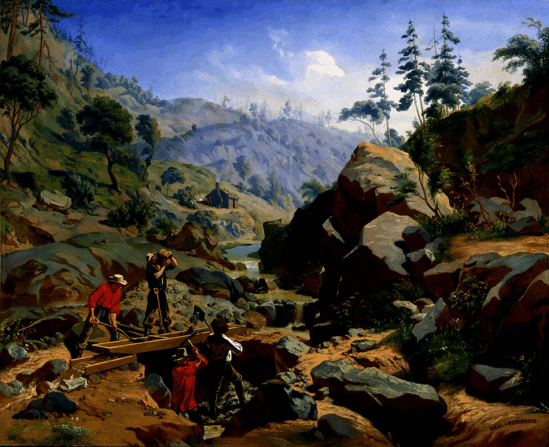
Tales of Placerville: More Tales
On this page we will regularly post additional materials; illustrations (both from the book and new), deleted scenes from the book, new Tales, and interesting historical information regarding Placerville. If you are familiar with websites that have information on the history of the gold rush and Placerville in particular, please forward them to us for our upcoming Links page. Or:
Return to our Home Page
Go to the Tales of Placerville Blog
To learn more, visit our California Gold Rush Bookstore to browse lots of great books and DVDs
ILLUSTRATION
Rufus Porter's Newspaper Advertisement for his Aerial Transport, 1848 (true!)

The Aerial Transport described in Tales of Placerville is real! Rufus Porter, founder of Scientific American magazine, actually built the craft in 1848. Unfortunately it never got off the ground, and real travel by dirigible didn't become practical until several decades later.
ILLUSTRATION
Placerville was the third largest city in California in 1854 (true!)

As mentioned in Tales of Placerville Placerville was the state's third largest city. Los Angeles was barely a village at #15.
ILLUSTRATION
Miners in the Sierra

From the back cover of Tales of Placerville: Charles Christian Nahl (1818-1878) and August Wenderoth (1819-1894), Miners in the Sierra, 1851, oil on canvas. Courtesy National Museum of American Art, Smithsonian Institution;gift of Fred Heilbron Collection.
Check out our regularly updated TALES OF PLACERVILLE BLOG for more information and to join in to discuss!
To learn more, visit our California Gold Rush Bookstore to browse lots of great books and DVDs.
DELETED SCENE #1 from TALES OF PLACERVILLE
The Bookstore Boys Meet Henry Wadsworth Longfellow and Nathaniel Hawthorne in Boston, 1848
One day (or, Once Upon A Time if you prefer), Jed and Jack were sitting in their theology class where they were meant to be listening to the lecture being given by their teacher, Professor Thalia. In actuality they were both reading. They often challenged one another over who could finish their current book first, sometimes (if they could each secure a copy) the same one. Jack was a full chapter ahead of Jed in their present competition, so Jed had brought his book to class and was furtively reading while the Professor spoke. Jack, not to be outdone, had his own copy hidden under the table where he could steal a sentence at a time. Professor Thalia occasionally put up with this sort of thing, which is likely why the Boys felt they had license to do it. Today, however, was the last straw for the theology teacher, and he decided that enough was enough. Jed was deeply engrossed in a particular passage when the Professor had the poor manners to walk up and snatch the book from his hands. “Isn’t that right, Mister Bradford?” Professor Thalia asked. “I’m sorry, sir,” Jed apologized, “I’m not sure I heard your entire question.” “I’m quite sure you heard none of it,” the Professor replied. He inspected the book he had taken from Jed. “Westward Ho, A Tale, by the author of The Dutchman’s Fireside,” he read. “James Kirke Paulding,” Jed explained. “Quite a fine playwright. Surely you’ve seen a performance of Lion of the West, the play about Davy Crockett?” “Not unless it was a miracle play and performed by a church choir,” Thalia snapped. As he watched his best friend get dressed down by the Professor, Jack slid the book he’d been reading onto the floor to hide it behind his feet. Before he could finish the action Thalia turned around. “And don’t think I didn’t notice you, Mister Norris. I expect to see both of you in the courtyard at the hour.” After the lecture had concluded they gathered their books and papers and followed the Professor to a set of benches under a bare elm tree. “You boys spend plenty of time in the library,” Professor Thalia said. “You’re bright, curious lads, well-read and quick of wit. Why aren’t your papers any better?” They admitted, somewhat reluctantly, that neither of them was reading the assigned work. Instead they were reading whatever caught their fancy or were busy writing their own stories. Boring tracts on theology and law didn’t hold a candle to the latest ripping yarn by Charles Dickens, Victor Hugo or James Fenimore Cooper. “Jed… Jack…,” the Professor said, “I find the both of you constantly reading during my lectures. When I take the books away I see you both reading the framed copies of the Ten Commandments and the Declaration of Independence that hang on the south wall… not that there is anything wrong with that in particular, of course…” “Sometimes I look out the window and read the sign on the conservatory across the street,” Jack admitted. “While listening to your lecture, of course!” he added when Thalia gave him a look of disapproval. “You both love reading and writing stories and I think that is a wonderful gift. You have to be careful, though, that you don’t end up living through these stories instead of living your own lives. There is the matter of vocation to consider.” “Yes, sir,” the boys said, chastised. Thalia thought for a moment. “Perhaps we can turn this liability into an asset. One of the professors holds a literary gathering every week for students, writing teachers, writers, and the associated trades,” he told them. “I often join in myself, although I cannot this week. It's an informal situation, often with just a handful of people attending, yet it might be useful for you to get to know some real writers and understand their lot. Would you like that?” “Absolutely, Professor!” the boys said together. “Very well,” Thalia said, handing them a piece of paper. “Here is the professor's name and address, with the time of the meeting. I will notify him in advance of your participation.” “Thank you so much, Professor!” Jack said. Of course the boys' imaginations began working immediately, conjuring images of the great coven of literary mages they would soon be a part of, discussing first person irregular and the foundation of modern fiction in early oral storytelling traditions. This brotherhood would introduce them to the secrets of composition, allow them contact with the underground of great editing and men of letters, and launch their careers as great authors. “Do you suppose there is a guild handshake?” Jack asked Jed. “I suppose there would have to be,” Jed said. “It’s a given in most secret societies.” Now, storytelling is in part a matter of pacing. I could go into a fair amount of detail concerning Jed and Jack’s meeting with the renowned professor, poet and author living in the Craigie House at 105 Brattle Street, but that might slow down our forward momentum. This book is called Tales of Placerville, and I’m sure you all want to get there eventually. So if you want the blow-by-blow details of this event you may read the complete account by turning to the back of this book, where it has taken up residence with other literary detritus. Here, for the sake of brevity and narrative progress I shall sum up that meeting by saying that the Bookstore Boys met two famous writers. The first, although a very successful writer, made his living by teaching at Harvard. The second, perhaps more successful, made his living working at the Custom House, a job that strangled his creativity and kept his muse at bay. It was raining heavily when they made their pilgrimage to the Craigie House at 105 Brattle Street. They stood in the rain and waited until it was exactly seven o’clock before knocking softly. Perhaps their reserve in the face of such great men was smothering their enthusiasm, as they knocked far too lightly. No one answered the door. They knocked again more insistently. Perhaps now their enthusiasm got the better of them. They pounded on the door so hard that the windows rattled. A man with an enormous nose and two great muttonchops answered the door. He seemed very annoyed. “What the hell is that noise?” “Professor Longfellow?” Jed asked, his hair slicked down by the rain. “Yes, yes, who are you?!” the man bellowed. “You look like a couple of drowned rats!” “My name is Jedediah Bradford, and this is Jack Norris. Professor Thalia sent us.” “He did, did he? And where is he? Quite the practical joke, he sends me his most troublesome students and then his regrets. Someone should box the man's ears.” Another man came to the door and laid a hand on Longfellow's shoulder. “Oh, calm yourself, Henry, they look like two perfectly equitable young gentlemen. Please invite them in out of the rain. Have a glass of brandy.” “Very well. Still, they are early. I expect the rain will keep all the decent fellows at home tonight and we shall have to make do with this sort.” Longfellow threw up his hands, turned, and gestured toward the library. Jed pulled out his pocket watch to verify the time, and it said that it was two minutes past seven. “You have a lovely home,” Jack said, glancing about the foyer. “Yes, isn't it?” Longfellow said, his annoyance converted suddenly to pride. “George Washington coordinated his troops from here during the Siege of Boston. It has history, this house.” The second man offered his hand. “Hello, Mister Bradford, Mister Norris. I am Nathaniel Hawthorne, Longfellow's consequent literary compatriot. I shall always be considered his afterthought.” The boys eagerly shook his hand. “Not at all, sir! Very pleased to meet you!” Hawthorne blushed. “You're Aldus Bradford's boy, are you?” he asked. “The printer?” Longfellow added. “Yes, sirs,” Jed said proudly. “So, you are his ink monkey?” Longfellow asked with a snort. “Hardly, sir! I am a student at Harvard, working to become an author of fiction,” Jed said. “Henry,” Hawthorne stopped his friend before he could reply. “A patient and generous spirit would be more seemly. Thalia thought well enough of these young gentlemen. Give them a chance.” “Thalia is a doctor of Theology, Hawthorne. His ability to root out future clergy I admire. His ability to recognize talent in literature I find questionable.” The quartet moved into the library and Longfellow directed the boys to a divan on the right. “Writers, eh? Both of you? What have you written?” Longfellow asked. “Nothing that has seen print so far,” Jed answered. “I write daily and fill journal after journal. I consider this to be something like an apprenticeship. To do something well requires practice and passion.” “See, Henry? An astute observation,” Hawthorne said. “It is, it is. I have always, even from the youngest age, eagerly aspired after eminence in literature. My whole soul has burned most ardently after it, and every earthly thought has always centered on it,” Longfellow admitted. “Passion is an absolute requirement.” “So you enjoy writing, then?” Jed asked. “Not at all,” Longfellow huffed. “I hate the sight of pen, ink, and paper. I was not born for scribbling and scratching. I was born to create literature. It is unfortunate that the latter generally requires the former.” “I quite enjoy the feel of the pen in my hand, the marvelous potentiality in the ivory paper. It is unformed clay, ready to be molded,” Jack spoke up. “Bully for you,” Longfellow grunted. “I tend to compose sketches, similar to those in Mister Hawthorne's ‘Twice Told Tales,’” Jed said. “See that, Hawthorne? Your sweet little book inspires the next generation. Washington Irving once told me that poetry was my particular calling,” Longfellow said, “though I believe that I have an equal facility for prose.” “You know Washington Irving?” Jack asked in awe. “Of course, of course,” Longfellow said, puffing on his tobacco pipe. He turned to the woman who had just entered the room. “Fanny, some wine for the men please,” Longfellow asked her. “Gin will be fine for the boys. No need to waste the good grape.” “It is a pity you have such a low opinion of your students,” Hawthorne chided Longfellow. “Perhaps you should question your vocation.” “Oh, I have nothing against my students,” Longfellow said. “Many of them will eventually grow fine and learned minds. It is more my own lot when I am among them that I detest, I suppose. I dislike constantly being a playmate for boys. I would much rather be stretching out and grappling with men's minds.” “Be careful not to overexert yourself, Henry,” Hawthorne laughed. “Mister Hawthorne, if it is not impertinent to ask, what are you writing these days?” Jack asked. “I find myself of late unable to put pen to paper,” Hawthorne answered, sighing. “My muse has gone silent. I was working on a new collection, which I refer to as ‘Old Time Legends.’ The legends are unfortunately few and far between. A writer can only write what he knows, boys. This is why it is so important that a writer gains broad experience in life. This is also, I think, the root of my problem. I have not lived, but only dreamed about living.” “That's rot, Hawthorne,” Longfellow said. “I am trying to resume my pen,” Hawthorne lamented. “Whenever I sit alone, or walk alone, I find myself dreaming about stories, as of old; but these days working in the Custom House undo all that the evenings have done. I should be happier if I could write. Mind this second lesson, boys - a writer must make a living. Be sure it is a job that is conducive to creative thought, or you may find yourself in my predicament.” “Dreaming isn’t the problem, Hawthorne,” Longfellow said, wagging a finger at his friend. “Without dreams humans remain immobile. The issue at hand is remaining practical enough that you can realize them. Mark my words, by this time year next you'll have a new book in print and be lauded from every rooftop. I'll wager you a bottle of Madeira.” Around nine o'clock the boys were ushered out the door. They had heard many things throughout the evening; opinions concerning composition, themes, allusion, allegory, and the traps of didactic writing. Yet, curiously, it was something completely alien to the process of writing that weighed on Jed as they walked home. “We need jobs,” Jed said. “Think of it. Even such lettered men as Professor Longfellow and Mister Hawthorne can’t make a living through their writing alone. Washington Irving served as the Minister to Spain. All of our efforts have been directed toward becoming writers. We haven't even considered what we might to do in order to live. What if we must take jobs, like Mister Hawthorne, that discourage creativity?” “We might become printers like your father,” Jack suggested. “Printers are surrounded by books and know many publishers and editors.” “With all due respect to my father, it isn’t a job which encourages the mind. It is mostly a mechanical thing; setting type, inking, dealing with papers, fixing the machines. I think we should start considering this. What on Earth shall we do to make our living that will make us better writers?” ©2011 Perry Bradford-Wilson
More to come soon! In the meantime, check out our main website at storytellerpress.com to see our entire line of books!
Return to Tales of Placerville Home Page